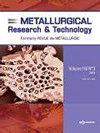Characterization of nanoscale precipitates and enhanced mechanical properties of high strength weld metals containing Cu additions after PWHT
IF 1.1
4区 材料科学
Q3 METALLURGY & METALLURGICAL ENGINEERING
引用次数: 2
Abstract
In order to match rapidly development of high strength low alloy steels, the new metal cored wire contained copper was designed. The multi-pass weld metals were obtained by gas metal arc welding. Results show that microstructure of weld metals is bainite with M-A constituents, and there are nano-9RCu precipitates after PWHT. The weld metal as welded achieves 737 MPa of yield strength (YS) and 1097 MPa of ultimate tensile strength (UTS), with an elongation 8%. After PWHT, the YS and UTS are 725 MPa and 968 MPa, respectively, and elongation increases to 16%. The lower dislocations density and reduction of Cu element at solid solution state hence for the decrease of YS. As well, the nano-Cu precipitates and reduction of effective grain size make it increase. The combined effect of these factors makes YS decrease by only 12 MPa after PWHT. Besides, a good impact performance (46.6 J) can be obtained after PWHT, while it is only 27.7 J of weld metals as welded. The improved toughness of weld metals after PWHT is obtained by the contributions of finer effective grain size, soft bainite, and dispersed nano-9RCu precipitation. The nano-Cu precipitates can improve strength without damage to toughness of weld metal after PWHT.PWHT后含Cu高强度焊缝金属纳米析出物及力学性能的增强
为适应高强度低合金钢的快速发展,设计了新型含铜金属芯线。采用气体保护金属电弧焊获得了多道焊缝金属。结果表明:焊缝金属组织为含M-A成分的贝氏体,PWHT后有纳米9rcu析出;焊缝金属的屈服强度(YS)为737 MPa,极限抗拉强度(UTS)为1097 MPa,延伸率为8%。经PWHT后,YS和UTS分别为725 MPa和968 MPa,伸长率提高到16%。位错密度的降低和固溶态Cu元素的还原是YS降低的原因。纳米cu的析出和有效晶粒尺寸的减小使其增大。这些因素的综合作用使得PWHT后的YS仅下降了12 MPa。此外,PWHT后的冲击性能良好(46.6 J),而焊接时的焊缝金属仅为27.7 J。PWHT后焊缝金属韧性的提高主要得益于有效晶粒尺寸的细化、贝氏体的软化和纳米9rcu的分散析出。PWHT后,纳米cu析出物可以在不破坏焊缝韧性的情况下提高焊缝强度。
本文章由计算机程序翻译,如有差异,请以英文原文为准。
求助全文
约1分钟内获得全文
求助全文
来源期刊

Metallurgical Research & Technology
METALLURGY & METALLURGICAL ENGINEERING-
CiteScore
1.70
自引率
9.10%
发文量
65
审稿时长
4.4 months
期刊介绍:
Metallurgical Research and Technology (MRT) is a peer-reviewed bi-monthly journal publishing original high-quality research papers in areas ranging from process metallurgy to metal product properties and applications of ferrous and non-ferrous metals and alloys, including light-metals. It covers also the materials involved in the metal processing as ores, refractories and slags.
The journal is listed in the citation index Web of Science and has an Impact Factor.
It is highly concerned by the technological innovation as a support of the metallurgical industry at a time when it has to tackle severe challenges like energy, raw materials, sustainability, environment... Strengthening and enhancing the dialogue between science and industry is at the heart of the scope of MRT. This is why it welcomes manuscripts focusing on industrial practice, as well as basic metallurgical knowledge or review articles.
 求助内容:
求助内容: 应助结果提醒方式:
应助结果提醒方式:


